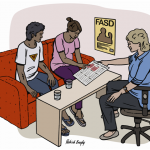Culturally appropriate tools needed to tackle FASD

FASD is currently not systematically diagnosed or reported. As there is no cure for FASD, the focus for those working in this field largely revolves around prevention strategies, the development of diagnostic tools, and support for individuals and families living with FASD.
While FASD is a community-wide issue, the prevalence of harmful drinking amongst Aboriginal and Torres Strait Islander women aged between 25-34 years is higher than for non-Indigeous women, and this is despite the fact that fewer Aboriginal and Torres Strait Islander women drink alcohol than do non-Indigenous women (ABS, 2006). Research evidence indicates that health professionals working in Aboriginal and Torres Strait Islander health care settings want and need access to information on alcohol and pregnancy and FASD which is culturally secure and acceptable for themselves and their clients (Payne et al., 2005; see also NIDAC, 2012).
In this context, the National Drug Research Institute (NDRI) at Curtin University was contracted by the Department of Health (DoH) to consult with Aboriginal and Torres Strait Islander health professionals and community members across Australia, to gather their views on the range of information and kinds of resources focused on alcohol, pregnancy and FASD they believed would be most useful within their local communities. The recently completed national FASD Resources project conducted 17 consultations with health professionals working in Aboriginal and Torres Strait Islander communities, and with community members across Australia. These consultations provided some critical insights around approaches to FASD education and prevention within these communities.
In sum, there is a need and desire for uniformity in the education of health professionals at all levels around issues of alcohol, pregnancy and FASD, to ensure uniformity in the message conveyed to community. There is a need for community-wide education and the development and availability of educational tools with which to address issues of alcohol and pregnancy with both sexes and all age groups. People want access to locally relevant resources, which are evidence based but flexible to local need. Aboriginal and Torres Strait Islander people want to be involved and engaged in the development of these strategies and resources, with the ability to utilise local knowledge and content. And there is a recognition that new social media and technology has the potential to develop and disseminate resources to reach a wider audience than more traditional resources, particularly among young people.
Responding to all of the above we have developed an iPad/Web PosterMaker application aimed primarily at health professionals. The PosterMaker includes content and images that are relevant to health professionals and to different groups within communities. Using the PosterMaker, services can choose to create a variety of locally relevant resources. Importantly, those communities outside of the consultation process can take some ownership of the resources they may choose to create from the app. It is hoped that the app will also be used as an educational tool in schools, and through local health/service providers who may work with local community members in producing their own posters. This will provide an opportunity for meaningful dialogue around pregnancy, alcohol and FASD and contribute to a broader understanding of issues of prevention and support for families living with FASD.
Download the web version of the 'FASD PosterMaker'.
For more information about the FASD PosterMaker app, view news article 'New NDRI app delivers culturally appropriate FASD resources'.
References
ABS. (2006). Alcohol consumption in Australia: a snapshot, 2004-2005. Canberra: Australian Bureau of Statistics (cat. no. 4832.0.55.001).
Payne, J., Elliott, E., D'Antoine, H., O'Leary, C., et al. (2005). Health professionals' knowledge, practice and opinions about fetal alcohol syndrome and alcohol consumption in pregnancy. Australian and New Zealand Journal of Public Health, 29(6), 558-564.
NIDAC. (2012). Addressing fetal alcohol spectrum disorder in Australia. Canberra: National Indigenous Drug and Alcohol Committee.










